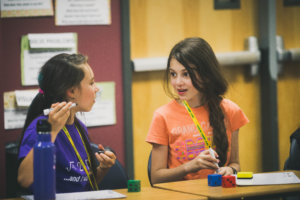Is My Child Gifted?
Determining whether or not your child is gifted is no easy task. As you have likely already discovered, there are a plethora of definitions, characteristics, assessments, theories – a virtual abundance of information. To help parents unravel some of the conflicting information, the Davidson Institute has put together this article summarizing gifted characteristics, the difference between tests and assessments, points to consider in having your child tested or assessed, different types of tests that can be utilized, and tips for locating a professional if you decide to seek a full assessment.
How do I know if my child is gifted?
There are many definitions of giftedness and equally as many ways to formally identify whether or not a child is gifted. Essentially, as NAGC defines in the article “What is Giftedness?”, “Children are gifted when their ability is significantly above the norm for their age.” Students can exhibit gifted abilities in various spheres – creatively, intellectually, musically, academically across the board or in a specific subject area such as math, language arts, or science. The Davidson Institute focuses on serving students with profound intellectual talents.
Signs of Giftedness in Children Include:
- an extreme need for constant mental stimulation
- an ability to learn and process complex information rapidly
- a need to explore subjects in surprising depth
- an insatiable curiosity, as demonstrated by endless questions and inquiries
- ability to comprehend material several grade levels above their age peers
- surprising emotional depth and sensitivity at a young age
- enthusiastic about unique interests and topics
- quirky or mature sense of humor
- creative problem solving and imaginative expression
- absorbs information quickly with few repetitions needed
- self-aware, socially aware, and aware of global issues
Gifted children may demonstrate some but not all of these traits; every child is different. To determine the extent of your child’s abilities, testing or a full assessment may provide some of the answers you are seeking. Because there are no federal mandates or national policies requiring gifted education, it is important for parents to review what gifted identification policies and procedures are in place in their area prior to seeking a test or assessment.

Should I have my child tested for giftedness?
Deciding whether you should pursue gifted testing or seek out a full professional assessment will be based on your overall goals and the questions for which you are seeking answers.
In fact, you may find it helpful to jot down the specific questions that led you to seek information about having your child assessed. What do you hope to discover about your child’s abilities? Will you use the results to gain entrance into a specific program? If so, which tests do they accept? Will you share the results with your child’s school? Which tests do they find most informative in understanding a student’s learning profile? Do you have concerns about your child’s performance or behavior?
Educational placement and access to talent development programming are common reasons for seeking an evaluation. If you are looking for a cost-effective option or are seeking admittance to a specific program, such as a talent search or the Davidson Institute, you may opt for having your child take an above-level test such as the PSAT 8/9, ACT, or SAT. If you’re planning to have your child take one of these tests in order to apply to a Davidson program, check out our low cost, remote testing options through our partnership with the Center for Talent Development. We offer Davidson-specific eligibility assessment opportunities for students in grades 3-10. For more information, please see our Eligibility Assessment page.
Another option is to speak with a testing professional about administering an individualized test – such as an achievement or intelligence test – without a complete assessment or full report. Choosing this path will not provide much, if any, information other than your child’s scores, but that may be enough to meet your goals.
On the other hand, if you are looking for a more complete picture of your child’s abilities, strengths, challenges, and needs, experts recommend a comprehensive assessment of the child’s abilities rather than simple testing. The rationale for assessment typically centers on the need for developing an understanding of a child’s relative strengths and weaknesses and how these relate to educational and social settings.
Learn more about the difference between tests and assessments in our article, Gifted Testing and Assessment.
When should I have my child tested for giftedness?
In regards to when to have your child tested, testing is generally believed to be most reliable and most predictive between the ages of six and nine years old. Although many assessments are approved to be administered to children as young as two years old, the consensus among professionals is that there is rarely a need to test before the child is ready to enter school and that testing at younger ages may not provide reliable results.
In the end, remember that test scores or results of a full assessment don’t change who your child is. The results are intended to provide you specific words and tools for better understanding your child. How you use those words and tools is up to you.

Which test should I have my child take?
There seems to be little consensus about which tests are most effective, especially when assessing exceptionally intelligent young people. Again, deciding which test is best for your child will partly be determined by your goals. If your child is assessed by a professional, the tester will typically discuss which tests will be used during the assessment based on their knowledge, training on specific tests, and their professional insight regarding the questions and concerns you have presented.
For academic planning, particularly if working with your child’s educators, you may want to find out which tests they are familiar with and will consider when determining how best to meet your child’s needs. Intelligence test scores, for example, may not provide as much information in relation to educational planning as an achievement test that delineates grade and age equivalents, or a proficiency test administered by the school. Parents can also read our article, Special Considerations in Gifted Identification and Assessment, to think through additional concerns and options.
The most widely used intelligence tests have long been criticized by the GT community. These tests were not developed to adequately identify individuals at the extremes. By definition, scores in the profound ranges occur less than one time in a thousand. The statistical infrequency of these extreme scores makes accurate measurement difficult. For this reason, many experts recommend utilizing a variety of tests or test sections to get the best combination of skills assessments.
Above-level tests are particularly useful for bright students as they provide a higher ceiling, allowing for more accurate assessment of the child’s true abilities. The results of these tests can often be compared to other students of a similar age or grade through talent searches. The PSAT 8/9, designed for students in eight and ninth grades, can be taken by students in third through sixth grade. The SAT or ACT, designed for students in their junior or senior years of high school, can be taken by students starting in the sixth grade.
Out-of-level testing and the talent search model are addressed in the following Davidson Gifted Database articles:
- Eight considerations for mathematically talented youth
- Discovering highly gifted students
- The talent search as an identification model
- Talent Search Opportunities for Gifted Students
We recommend consulting with a therapist or psychologist to discuss and determine what type of testing or assessment might be best fit for your child and your goals. They will be better able to discuss the specifics of available testing and discuss any concerns or questions you may have about specific tests and your child’s profile.
How can I find a testing professional?
Finding a professional to evaluate your child can be challenging, but there are several resources available. You can start by finding options through our Gifted Testers and Therapists List. Your state’s gifted association, a regional special education advocacy group, a local parent’s group, the state department of education, or your child’s school counselor, psychologist or social worker may also be able to refer you to a local professional. Websites such as Supporting the Emotional Needs of the Gifted (SENG), the 2e Newsletter, and Hoagies’ Gifted provide lists of professionals that have experience working with gifted children.
For more information on where and who to go to for gifted identification, read our article on How to Get Your Child Tested for Giftedness.

Important questions to ask when seeking a gifted assessment
The Davidson Institute has identified certain questions that can be helpful in identifying a knowledgeable professional to evaluate your child. If you receive answers that are not satisfactory to you, you may wish to seek a second opinion or continue your search for a tester. Ideally, you will encounter a very knowledgeable professional, whom you and your child feel comfortable working with, to conduct a comprehensive assessment of your child’s abilities and make specific recommendations. If you are unable to find a local tester, you will need to weigh the relative pros and cons of searching more broadly for an appropriate professional.
Credentials/Training
- What is your training and background?
- Are you licensed and/or certified to practice as a testing professional?
- What do you consider your specific area of expertise to be?
Experience with Gifted Children
- How much experience have you had in testing very bright or precocious children?
- What is your experience in working with a child of this age and with children of advanced cognitive abilities? NOTE: The National Register of Health Service Providers in Psychology, has a list of licensed practitioners that includes their documented areas of expertise.
- Are you licensed to make mental health diagnoses? Are you familiar with the ways in which gifted students can be misdiagnosed, as well as how mental health diagnoses often present in intellectually advanced students? NOTE: See Interview with Marianne Kuzujanakis on Misdiagnosis for more information on this topic.
About the Tests
- What tests do you typically administer in the context of a comprehensive assessment? How do you decide which tests to utilize?
- What is your practice when you don’t get the information you need from a standardized test; how do you gather other types of information about a child?
- If a child reaches the end of a subtest or test, without reaching a ceiling, how do you interpret that and how do you indicate that in your assessment report?
- How do you evaluate issues of underachievement in gifted children?
- What is your experience with “out-of-level” testing?
Information about the Child
- What is the array of tests and information you have or need to have to evaluate my child?
- How much do you want to know about my child’s previous testing? NOTE: The parent should inform the examiner of previous testing the child has had and the results that were obtained, if these are known. If testing results are discrepant, you can ask for an interpretation of the conflicting results. It would also be helpful for the parent to share evidence of the child’s talents both within the educational as well as home and community settings.
How to Prepare Your Child
- How should I best prepare my child to be assessed?
- How do you prepare my child?
- How long should we expect the assessment to last?
- How are break times determined?
- Is there anything we should bring to the assessment to ensure my child is comfortable?

Using the Results for Educational Planning
- Are you familiar with gifted program eligibility at the state and local level?
- How would you decide if a child is a candidate for grade or subject matter acceleration?
- Are your test reports accepted by local schools and programs for the gifted as part of their admissions process?
- Pragmatically, how can the information you expect to gather be put to use in the service of my child?
- Have you worked with students in my school system before? If so, how would you describe your effectiveness?
- Are you available to explain the educational implications of the test results to school officials? Is there an additional fee for this type of meeting?
Follow-up
- How do you suggest the results be explained to my child? Are you available for discussing this with my child, or will you advise us on how to do this?
- If the results seem inconsistent with what was anticipated, what would be the next course of action?
- What type of follow-up will we receive? Will you be preparing a written report for us? What will be included in this report? When will we receive the report?
- What are your procedures for providing results to my child’s school? NOTE: Some psychologists will provide a “sanitized” report to the school that thoroughly addresses test results and recommendations but doesn’t include information that is unlikely to have a direct benefit for the child in the school setting. Information on family dynamics and labels, for example, is omitted so that parents have a choice of sharing the full evaluation report with the school.
More Resources for Gifted Children & Their Families:
- Gifted Programs & Scholarships
- Gifted Testing & Assessment
- Gifted Characteristics
- How to Get Your Child Tested for Gifted Identification
- Special Considerations in Gifted Identification and Assessment
- Guiding Gifted – A monthly newsletter from the Davidson Institute for those who work with or have a gifted or twice-exceptional child in their family.
- Davidson Gifted Perspectives – A video series that examines several different gifted-related issues and viewpoints.